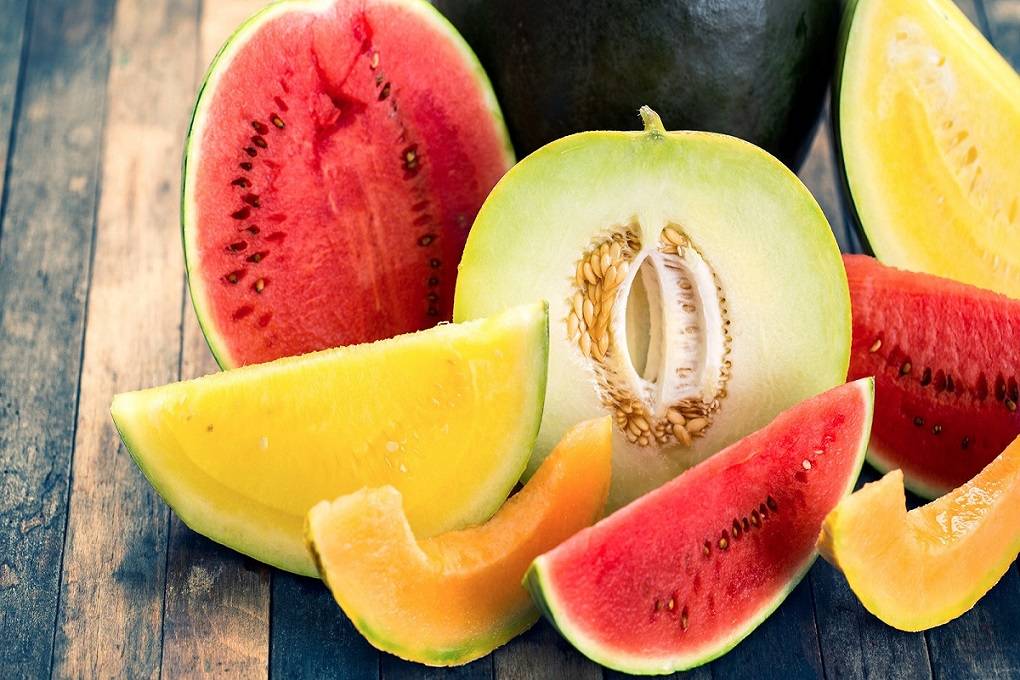
Melons and watermelons are a cool, sweet, and refreshing treat in the summers. Both of these fruits which coincidentally belong to the same family are enjoyed around the world. However, both the fruits and their varieties have striking visual and textural differences that set them apart. Let’s take a look at them.
Watermelon Vs Melon?
Watermelon is a large round fruit that has a green rind and a red interior. It is believed that the watermelon was first domesticated in Northeast Africa over 4,000 years ago. Watermelon is a nutrient-rich summer fruit that is sweet and juicy. On the other hand, melon is another fruit that belongs to the same family as watermelon.
There are a few varieties of melon, however, most of them have a yellowish exterior and white or greenish-yellow flesh. Unlike watermelon, melon’s seeds are not dispersed throughout its flesh. However, just like watermelon, melon is also considered a popular summer fruit because of its sweet taste and cooling effect on the body.
Nutritional Profile of Watermelon and Melon:
Watermelon is a treasure trove of nutrients such as vitamin A, vitamin C, potassium, carotenoids, lycopene, cucurbitacin, and magnesium. It has a high water, sugar, and carbohydrate content. But it is generally low in calories and fat.
Melon has fewer calories than watermelon and almost no fat. It also has more fibre and carbohydrates than watermelon. Melons are a rich source of vitamin C, vitamin B6, vitamin K, potassium, folate, magnesium, beta-carotene, phytoene, quercetin, and caffeic acid.
Health Benefits of Watermelon and Melon:
Watermelon- Watermelon’s flesh is almost entirely made from water. Watermelon’s high-water content helps us remain hydrated for longer periods of time during summer. It also makes us feel fuller which helps us avoid overeating. Watermelon is packed with nutrients that support heart health. For instance, lycopene present in watermelon helps lower cholesterol and blood pressure.
Watermelon also contains citrulline which increases the levels of nitric oxide in the body. And nitric oxide helps expand the blood vessels which lowers our blood pressure. Antioxidants, lycopene, and vitamin C present in watermelon helps lower inflammation and prevent age-related macular degeneration. Some studies also show that citrulline present in watermelon reduces muscle soreness and improves exercise performance.
Melon- Most varieties of melons are low-sodium and potassium-rich, therefore, it positively influences our blood pressure regulation and maintains healthy blood pressure levels. Melons are a rich source of essential nutrients such as folate, vitamin K, and magnesium, all of which are vital for repairing and maintaining strong bones.
Melons are 90% water and contain electrolytes such as potassium, magnesium, calcium, and sodium. This combination of water and electrolytes ensures that our body is effectively hydrated and it even helps us stay hydrated for longer periods of time. Melons’ high vitamin C content ensures that collagen, a structural protein required for repairing skin tissue, is produced properly. Vitamin C also helps protect our skin from sun damage.
Both melon and watermelon are summer fruits that can be incorporated into our diet as it is or as an ingredient in salads. In many cultures, it is advised to not drink water after consuming watermelon and melon because it can disrupt the digestive process and even cause bloating because watermelon is already rich in water.









